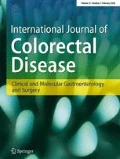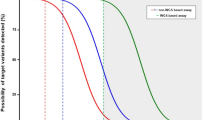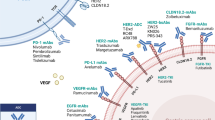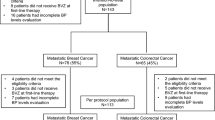Abstract
Introduction
The endothelium and angiogenesis are therapeutic targets in cancer. Response to treatment may be assessed by laboratory plasma markers such as circulating endothelial cells (CECs), endothelial progenitor cells (EPCs), von Willebrand factor (vWf), soluble E selectin, vascular endothelial growth factor (VEGF) and angiogenin. We hypothesised that these markers, obtained before surgery, would predict 2-year outcome after surgery with or without anti-angiogenic therapy for colorectal cancer (CRC).
Methods
We recruited 154 patients with CRC, of whom 51 were treated with surgery alone, 74 were treated with standard chemotherapy (5-fluorouracil) and 29 were treated with standard chemotherapy plus anti-VEGF therapy (Avastin). Peripheral blood was taken before surgery. CD34+/CD45−/CD146+ CECs and CD34+/CD45−/CD309 [KDR]+ EPCs were measured by flow cytometry and plasma markers by ELISA.
Results
After a mean of 2.1 years follow-up (range 1.9–2.3 years), 52 of the patients (33.7 %) experienced a poor outcome (radiological and/or histological evidence of tumour spread or recurrence, or death [n = 26]). In univariate analysis, poor outcome was linked to Dukes’ stage (p < 0.001), American Joint Committee on Cancer (AJCC) stage (p < 0.001), type of treatment (surgery alone, standard chemotherapy with or without anti-antigenic therapy) (p = 0.047), CECs (p < 0.02) and EPCs (p < 0.01). In subsequent binary logistic regression analysis, only Dukes’ stage (hazard ratio 2.3, 95 % confidence interval 1.0–5.3, p = 0.047) and modified AJCC stage (4.62, 1.88–11.33, p < 0.001) predicted a poor outcome.
Conclusion
Endothelial cell markers (CECs, EPCs, vWf, soluble E selectin) and growth factors (VEGF and angiogenin), measured before surgery, have nothing extra to offer in predicting 2-year outcome in colorectal cancer when compared to Dukes’ or AJCC stage.


Similar content being viewed by others
References
Cancer Research UK: http://info.cancerresearchuk.org/utilities/atozindex/atoz-bowel-cancer
Folkman J (1990) What is the evidence that tumors are angiogenesis dependent? J Natl Cancer Inst 1990:824–6
Takahashi Y, Kitadai Y, Bucana CD, Cleary KR, Ellis LM (1995) Expression of vascular endothelial growth factor and its receptor, KDR, correlates with vascularity, metastasis, and proliferation of human colon cancer. Cancer Res 55:3964–8
Shimoyama S, Yamasaki K, Kawahara M, Kaminishi M (1999) Increased serum angiogenin concentration in colorectal cancer is correlated with cancer progression. Clin Cancer Res 5:1125–30
Koutras AK, Starakis I, Kyriakopoulou U, Katsaounis P, Nikolakopoulos A, Kalofonos HP (2011) Targeted therapy in colorectal cancer: current status and future challenges. Curr Med Chem 18:1599–612
Gil-Bazo I, Catalán GV, Gutiérrez A, Rodríguez J, Páramo FJA et al (2005) Impact of surgery and chemotherapy on von Willebrand factor and vascular endothelial growth factor levels in colorectal cancer. Clin Transl Oncol 7:150–5
Sato H, Usuda N, Kuroda M, Hashimoto S, Maruta M, Maeda K (2010) Significance of serum concentrations of E-selectin and CA19-9 in the prognosis of colorectal cancer. Jpn J Clin Oncol 40:1073–80
Dome D, Dobos J, Tovari J, Paku S, Kovacs G, Ostoros G, Timar J (2008) Circulating bone marrow-derived endothelial progenitor cells: characterization, mobilization, and therapeutic considerations in malignant disease. Cytometry A 73:186–93
Rowand JL, Martin G, Doyle GV, Miller MC, Pierce MS, Connelly MC, Rao C, Terstappen L (2007) Endothelial cells in peripheral blood of healthy subjects and patients with metastatic carcinomas. Cytometry A 71:105–13
Fürstenberger G, von Moos R, Lucas R, Thürlimann B, Senn HJ, Hamacher J, Boneberg EM (2006) Circulating endothelial cells and angiogenic serum factors during neoadjuvant chemotherapy of primary breast cancer. Br J Cancer 94:524–31
Beerepoot LV, Mehra N, Vermaat JS, Zonnenberg BA, Gebbink MF, Voest EE (2004) Increased levels of viable circulating endothelial cells are an indicator of progressive disease in cancer patients. Ann Oncol 15:139–45
Blann AD, Pretorius A (2006) Circulating endothelial cells and endothelial progenitor cells: two sides of the same coin, or two different coins? Atherosclerosis 188:12–8
Ding YT, Kumar S, Yu DC (2008) The role of endothelial progenitor cells in tumour vasculogenesis. Pathobiology 75:265–73
Mancuso P, Bertolini F (2010) Circulating endothelial cells as biomarkers in clinical oncology. Microvasc Res 79:224–8
Hurwitz H, Fehrenbacher L, Novotny W, Cartwright T, Hainsworth J, Heim W et al (2004) Bevacizumab plus irinotecan, fluorouracil, and leucovorin for metastatic colorectal cancer. N Engl J Med 350:2335–42
Blann AD, Ramcharan KS, Stonelake PS, Luesley D, Lip GY (2011) The angiome: a new concept in cancer biology. J Clin Pathol 64:637–43
Ramcharan KS, Lip GY, Stonelake PS, Blann AD (2011) The endotheliome: a new concept in vascular biology. Thromb Res 128:1–7
Ramcharan SK, Lip GYH, Stonelake PS, Blann AD (2013) Angiogenin outperforms VEGF, EPCs and CECs in predicting Duke’s stage in colorectal cancer. Eur J Clin Invest 43:801–8
Dukes CE (1932) The classification of cancer of the rectum. J Pathol Bacteriol 35:323
Astler VB, Coller FA (1954) The prognostic significance of direct extension of carcinoma of the colon and rectum. Ann Surg 139:84–6
Cassidy J, Clarke S, Díaz-Rubio E et al (2008) Randomized phase III study of capecitabine plus oxaliplatin compared with fluorouracil/folinic acid plus oxaliplatin as first-line therapy for metastatic colorectal cancer. J Clin Oncol 26:2006–12
Cheeseman SL, Joel SP, Chester JD et al (2002) A ‘modified de Gramont’ regimen of fluorouracil, alone and with Oxaliplatin, for advanced colorectal cancer. Br J Cancer 87:393–9
André T, Boni C, Mounedji-Boudiaf L et al (2004) Oxaliplatin, fluorouracil, and leucovorin as adjuvant treatment for colon cancer. N Engl J Med 350:2343–51
André T, Boni C, Navarro M et al (2009) Improved overall survival with oxaliplatin, fluorouracil, and leucovorin as adjuvant treatment in stage II or III colon cancer in the MOSAIC trial. J Clin Oncol 27:3109–16
Twelves C, Wong A, Nowacki MP et al (2005) Capecitabine as adjuvant treatment for stage III colon cancer. N Engl J Med 352:2696–704
Goon PK, Lip GY, Stonelake PS, Blann AD (2009) Circulating endothelial cells and circulating progenitor cells in breast cancer: relationship to endothelial damage/dysfunction/apoptosis, clinicopathologic factors, and the Nottingham Prognostic Index. Neoplasia 11:771–9
Blann AD, Balakrishnan B, Shantsila E, Ryan P, Lip GY (2011) Endothelial progenitor cells and circulating endothelial cells in early prostate cancer: a comparison with plasma vascular markers. Prostate 71:1047–53
ACPGBI 2007. http://www.acpgbi.org.uk/content/uploads/2007-CC-Management-Guidelines.pdf
Eisenhauer EA, Therasse P, Bogaerts J, Schwartz LH, Sargent D, Ford R et al (2009) New response evaluation criteria in solid tumours: revised RECIST guideline (version 1.1). Eur J Cancer 45:228–47
Parulekar WR, Eisenhauer EA (2002) Novel endpoints and design of early clinical trials. Ann Oncol 13(Suppl 4):139–43
Kemeny N, Braun DW Jr (1983) Prognostic factors in advanced colorectal carcinoma. Importance of lactic dehydrogenase level, performance status, and white blood cell count. Am J Med 74:786–94
Matsusaka S, Mishima Y, Suenaga M, Terui Y, Kuniyoshi R, Mizunuma N, Hatake K (2011) Circulating endothelial progenitors and CXCR4-positive circulating endothelial cells are predictive markers for bevacizumab. Cancer 117:4026–32
Ronzoni M, Manzoni M, Mariucci S, Loupakis F, Brugnatelli S, Bencardino K et al (2010) Circulating endothelial cells and endothelial progenitors as predictive markers of clinical response to bevacizumab-based first-line treatment in advanced colorectal cancer patients. Ann Oncol 21:2382–9
Gupta M (2007) Circulating endothelial cells and circulating endothelial cell progenitors as surrogate markers for determining response to antiangiogenic agents. Clin Colorectal Cancer 6:337–8
Li B, Sharpe EE, Maupin AB, Teleron AA, Pyle AL, Carmeliet P, Young PP (2006) VEGF and PlGF promote adult vasculogenesis by enhancing EPC recruitment and vessel formation at the site of tumor neovascularization. FASEB J 20:1495–7
Asahara T, Takahashi T, Masuda H, Kalka C, Chen D, Iwaguro H, Inai Y, Silver M, Isner JM (1999) VEGF contributes to postnatal neovascularization by mobilizing bone marrow-derived endothelial progenitor cells. EMBO J 18:3964–72
Bellows CF, Zhang Y, Chen J, Frazier ML, Kolonin MG (2011) Circulation of progenitor cells in obese and lean colorectal cancer patients. Cancer Epidemiol Biomarkers Prev 20:2461–8
Fujisaki K, Mitsuyama K, Toyonaga A, Matsuo K, Tanikawa K (1998) Circulating vascular endothelial growth factor in patients with colorectal cancer. Am J Gastroenterol 93:249–52
Werther K, Christensen IJ, Brünner N, Nielsen HJ (2000) Soluble vascular endothelial growth factor levels in patients with primary colorectal carcinoma. The Danish RANX05 Colorectal Cancer Study Group. Eur J Surg Oncol 26:657–62
De Vita F, Orditura M, Lieto E, Infusino S, Morgillo F, Martinelli E et al (2004) Elevated perioperative serum vascular endothelial growth factor levels in patients with colon carcinoma. Cancer 100:270–8
Kumar H, Heer K, Lee PW, Duthie GS, MacDonald AW, Greenman J et al (1998) Preoperative serum vascular endothelial growth factor can predict stage in colorectal cancer. Clin Cancer Res 4:1279–85
Conflict of interest
The authors have no financial disclosures. There was no specific funding source.
Author information
Authors and Affiliations
Corresponding author
Rights and permissions
About this article
Cite this article
Ramcharan, K.S., Lip, G.Y.H., Stonelake, P.S. et al. Increased pre-surgical numbers of endothelial progenitor cells and circulating endothelial cells in colorectal cancer fail to predict outcome. Int J Colorectal Dis 30, 315–321 (2015). https://doi.org/10.1007/s00384-014-2116-3
Accepted:
Published:
Issue Date:
DOI: https://doi.org/10.1007/s00384-014-2116-3




